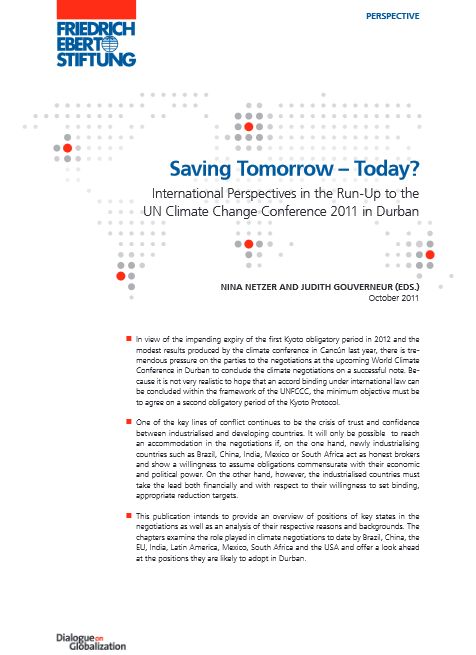Outcome of the Climate Change Conference in Durban and its implications for Egypt – Ecologic Institute at the "Cairo Climate Talks"
- Presentation
- Date
-
- Location
- Cairo, Egypt
- Panel discussion
-
Mohamed Nasser
Dr. Camilla Bausch of Ecologic Institute was invited to the Cairo Climate Talks to present and discuss the results of the UN climate conference in Durban together with Mohamed Nasser of the Egyptian Ministry of Foreign Affairs. In addition, both speakers were given the opportunity to present their perspectives to around two dozen experts, many from the Egyptian administration, in an open discussion session.
The focus of both presentations was on the future of the UN climate regime, the international financing of climate mitigation and adaptation, market-based mechanisms, and the general level of ambition combating climate change. Although the results from Durban were generally considered a step in the right direction, it was made very clear that they are not sufficient to reach the global goal of keeping global warming below 2 degrees Celsius. The international community will still be presented with significant challenges at the negotiations in 2013 and beyond. The negotiations over the future climate regime will be challenged by the task to develop a common understanding how e.g. the principle of "common but differentiated responsibilities and respective capabilities" translates into defining concrete commitments and actions in a changing world.
The discussion touched upon topics such as Egyptian energy subsidies and Egypt's opportunities to mitigate climate change through the use of renewable energy technologies and improvements in energy efficiency. The future of the Clean Development Mechanism (CDM) was addressed considering potential low demand for CERs in the future. The insufficient ambition of the international community with respect to mitigation commitments and action was debated with a sense of great concern. Participants were greatly interested in possibilities for global finance, especially from the Green Climate Fund. Finally, viewpoints about the role of Egypt and comparable middle income countries in international climate policy were exchanged; among other things, some bemoaned that in the negotiations the focus appears to lie upon large countries like China on the one hand and small island states (SIDS) and least developed countries (LDCs) on the other, while countries like Egypt and their potential role are neglected.
The Cairo Climate Talks (CCT) were designed to raise awareness within the Egyptian citizenry and to engender exchange and cooperation between relevant players. The CCT are conducted under the umbrella of the German Embassy in Cairo in cooperation with the Egyptian Ministry of State for Environmental Affairs, the Egyptian Environmental Affairs Agency (EEAA), the Deutschen Gesellschaft für Internationale Zusammenarbeit (GIZ), the German Academic Exchange Service (DAAD), and the Egyptian German Joint Committee on Renewable Energy, Energy Efficiency, and Environmental Protection (JCEE).
The CCT website is to be launched soon: http://cairoclimatetalks.net/.




